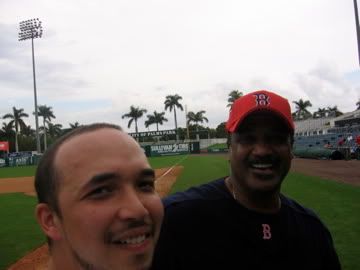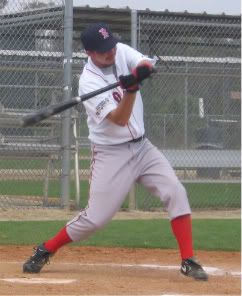 |
| Berto and Jim Rice |
When we left my host asked "So, did you get an autograph?"
"From who?" I had no idea what he was talking about.
"Tony Perez. The guy sitting next to you."
"Like, Big Red Machine? Tony Perez?"
"Yeah. The guy you were talking to."
"No. No one told me that was Tony Perez."
"So I guess you didn't meet Cepeda either."
"Orlando Cepeda?"
"Yeah, with the hat."
"I met him. We talked. I didn't get his name. Dude, you have got to tell me these things."
So there it was. I had just spent four hours talking baseball with a couple hall of famers and didn't even know it. Looking back it was probably a good thing I didn't know. I wasn't intimidated or over awed. I probably said somethings that made me look stupid in regards to baseball but I was myself. When I remember that day I don't dwell on the missed opportunity to get autographs and take pictures. I think of the rare chance to sit with legends on an equal footing. They didn't look at me and shake their heads at this kid who thought he knew the game. They engaged me in conversation. What I didn't know that day gave me a rich and treasured experience.
Ten years later I had another rare baseball opportunity. I was hired to work at the boston Red Sox fantasy camp . The camp was staffed by a mix of former Red Sox like Spaceman Lee, Oil can Boyd, and others who didn't have cool nicknames with appearances by current Red Sox coaches, hall of famer Carl Yastrzemski, and future hall of famer Jim Rice. Everyone (except Yaz who was only there for one day) did a great job of integrating the campers, men between the ages of 30 and 75, with the former players. Again here was a group of former big leaguers treating everyone around them as equals. Maybe this shouldn't be such a big deal, but in an age of pampered stars it was refreshing.
The main difference between the camp experience and the luxury box experience is that I knew who most of the players were. I had a chance to read a little bit about them and their careers before I arrived, they were introduced the first day, we spent a week hanging out and playing ball ten hours/day. We got a chance to get to know them. At one point Jim Rice asked me about my mismatched uniform (white home jersey/grey away pants):

"They didn't give me a uniform Jim. I had to put this together myself."
"Aw c'mon it's not what you know, it's who you know. If you had come to us we could have hooked you up."
"I didn't know I knew you Jim."
One of my favorite guys was Luis Tiant. El Tiante was a good guy. Sox fans love Luis Tiant. I was not a Sox fan so all I knew about Tiant, other than him pitching in the 1975 World Series, is what I learned by talking to him. I knew he was from Cuba. I learned that he likes cigars and he's a jovial joking, kind hearted man. I left camp with a fond impression of El Tiante. It turns out I had only scratched the surface. I if I had known then what I've learned since I would have stood in awe of him.
ESPN recently premiered "The Lost Son of Havana" a film about Luis Tiant's first trip back to Cuba in 46 years. Luis Tiant was playing pro ball in Mexico when the Bay of Pigs Invasion occurred. At that time cuban athletes playing abroad were told to either come home and play amateur baseball or be exiled. Tiant, whose father had played in the Negro Leagues, chose Major League Baseball and exile. I won't recount his entire career here except to mention that Luis began playing in the US under Jim Crow, came back from injury, perception and age several times, and turned in one of the great World Series pitching performances of all time albeit in a losing cause. The crowning moment for Tiant was 1975 when Fidel Castro allowed Tiant's parents to leave cuba to watch their son pitch for the Red Sox. They hadn't seen each other in 14 years. El Tiante's father Luis Tiant Sr. who had pitched the New York Cubans to their only Negro League title was finally allowed to take the mound in a major league park when he threw out the first pitch at Fenway prior to his son's game. A year later both of Luis Tiant's parents passed away within a few hours of each other, his father of cancer and his mother of a ruptured aorta.
The legacy of Luis Tiant is that of a man who gave up everything to follow his dream. He gave up his family, and he gave up his homeland. His desire to test himself at the highest level and to fulfill the dream his father was never able to attain turned him into a permanent sojourner. He faced discrimination here and a mixture of scorn and admiration at home. Luis Tiant is a symbol of strength and perseverance. He is also part of the enduring legacy of Jackie Robinson.
It may seem like a leap to go from Luis Tiant to Jackie Robinson but follow me for a moment. There has been a lot of talk over the past few years about the dwindling impact of Jackie Robinson's legacy. People point to the decreasing numbers of African Americans in the majors as though it's a slap in the face of all the Robinson endured. The claims often indicate that baseball is not doing enough to attract African Americans to the sport and is thereby disrespecting Robinson in the process. This analysis in itself diminishes the impact of Robinson's legacy by overlooking dark skinned Latin American players.
Luis Tiant Sr. was not African American but he was barred from playing major league baseball because of his skin color. Jackie Robinson did not just break the color barrier for African Americans, he broke it for all players of color. Without Jackie Robinson there would have been no El Tiante in Boston, we would never have seen Manny Being Manny, no Pedro striking out six in the all star game. Without Robinson there is no Clemente. Without Robinson there is no Tony Perez or Orlando Cepeda for me to lead off this article with. Without Jackie Robinson there is no Mpho Ngoepe. Haven't heard of him?
Mpho Ngoepe is a Pirates minor leaguer and the subject of a recent Sports Illustrated article. Mpho, or "Gift" is trying to become the first ever African player in the Major Leagues. People who focus on the number of African American players in the major leagues as the sole measure of Jackie Robinson's legacy are doing a disservice to both Robinson and to all of the dark skinned Latino players who have come into the league since 1947. They are also marginalizing players like Gift who will come into the league in future years.
In the end it isn't about who you know. It's what you know about them. Orlando Cepeda, Tony Perez, and Jim Rice are all in the Hall of Fame. Meeting them was a thrill, even if only in hindsight. But everything I know about them begins and ends with their credentials. It's Tiant that I will always remember the most. Thinking about this jovial little butterball that I joked with and drank with for a week one spring, how I saw him then, and everything I've learned about him since will stick with me as one of the most cherished experiences of my life. Knowing that this man who had been through so much, dealt with so much pain, could keep on smiling is something I hope I can carry into my own life. When I sit down to teach my son about baseball I'll teach him about Rickey and Campy, and Manny. But I'll take extra time to teach him about Jackie, and Clemete, and Tiant, the man who gave up everything, and kept on laughing.

Great picture of you and The Lost Son of Havana.
ReplyDelete